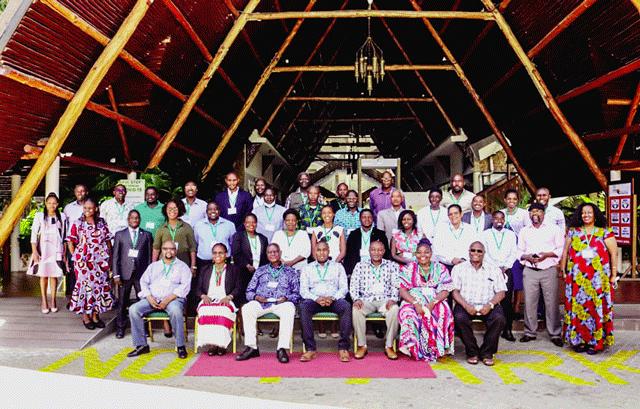Africa-Press – Eswatini. The African Forest Forum (AFF) has urged African countries to prioritise aggressive plantation establishment as well as developing feasible deforestation strategy.
This is according to Professor Labode Popoola who was speaking during a media roundtable session on individual government priority to grow forest cover.
The media roundtable was organised by the AFF to discuss the state of African forests as well as forests, people, and climate change began on March 28 until April 1.
The hybrid event hosted in Kenya was attended by journalists from across the continent in person and virtually.
Popoola said there was a need to diversify the livelihoods of people who lived in and around forest areas with the intent to reduce pressure on forests across Africa.
He pointed out that industry, business, and governments must demonstrate true leadership by making the urgent changes needed to avoid the worst consequences of climate change by placing sustainability at the heart of their decision-making process in an attempt to slow climate change.
Popoola said destroying forests, consequently harmed biodiversity and human lives, as forests provided fresh water, cleansed the air, inspired spiritual value, and provided humanity with food, adding that the challenge, therefore, remained to halt deforestation and begin the process of restoring forests.
Meanwhile, AFF Executive Secretary Professor Godwin made mention that 3.9 hectares of forests had been lost per year between 2010 and 2020.
He continued that it was however sad that many African countries were not maintaining forests inventory.
As a result the AFF relied on estimates presented by national governments when they wrote their global forest assessment reports.
“The 2020 forest assessment report, indicates that African countries have more than 10 per cent forest cover, whereas only 10 countries on the continent account for 50 per cent forest cover,” he said.
AFF Senior Programme Officer Professor Marie Louise Avana agreed that indeed African forests were unsustainably being lost, with insect invasion, accounting for 37 per cent of loss and wildfire ravaging at least 29 per cent of the African forests.
According to Avana, the forest assessment report of 2020 indicated that Africa is one of the leading region in forest loss, with eastern and southern Africa leading at 62 per cent followed by West and Central Africa.
She further cautioned African forestry stakeholders to double efforts of forest conservation, lest the continent cries.
“Efforts to conserve and reforest are not really compensating what is being lost,” she said.
According to reports, forests are crucial at a continental scale for maintaining environmental quality and stability.
They provide local to global important ecosystem services, such as the protection of water and soil resources, biodiversity conservation, and climate change adaptation and mitigation and apart from the ecological perspective, studies from an economic perspective conclude that forest resources can contribute to a nation’s economic growth and maintaining forest cover is essential for various agricultural and forestry-related activities.
Forests provide more than 86 million green jobs while supporting the livelihoods of many people. Everyone on the planet has had some form of contact with forests. This includes communities which directly rely on these ecosystems for their lives and the livelihoods of communities that rely on the products obtained from these forests.
…COP26 Glasgow climate pact to help redesign African agricultural policies
The Glasgow Climate Pact adopted by UN nations last year is expected to help in redesigning agricultural policies as agriculture activity is one of the drivers of forest cover loss amongst others.
This was part of a response by African Forest Forum (AFF) Senior Programme Officer Djibril Dayamba after a journalist from Botswana, Baboloki Semele sought for clarification on how organisations could develop their net-zero targets and roadmaps. This was during a media roundtable session organised by the AFF. Dayamba responded that at COP 26, in Glasgow, last year, nations adopted the Glasgow Climate Pact, aiming to turn the 2020s into a decade of climate action and support.
He stated that that the package included strengthened efforts to build resilience to climate change, curbed greenhouse gas emissions, and provided the necessary finance for both.
“Measures adopted at COP 26, as far as forest conservation is concerned include moving away from coal power, reversing deforestation, reducing methane emissions as well as switching to the electric vehicles,” he said.
In term of prospect and forest conservation, Dayamba said whether COP26 had delivered pressure for action, there was a direction taken towards the forest under the Glasgow Leaders’ Declaration on forests and land use.
He continued and urged African governments and forest stakeholders to adhere, as it would serve as a basis to conserve forest and other terrestrial ecosystems and accelerate restoration, facilitate trading and development policies that do not drive land degradation, reduce vulnerability and enhance livelihood for people, keeping in mind the issue of degradation.
“If this instrument is followed to the core, it will serve as a tool to reaffirm international financial commitment as finance is critical to addressing forest cover loss,” he said. He added that alternative capacities needed to be deployed to ensure that Africa benefits, not as an observer, but key stakeholder in forest management.
This is in terms of lack of access to international finance by most African states. On November 2 2021 at the 26th global climate summit, it was announced that the instrument would be used as a guideline to halt and reverse deforestation and land degradation by 2030.
Representatives from 141 countries, translating to 90.94 per cent of world forest cover committed to working collectively to halt and reverse forest loss and land degradation by 2030 while delivering sustainable development and promoting an inclusive rural transformation.
For More News And Analysis About Eswatini Follow Africa-Press







